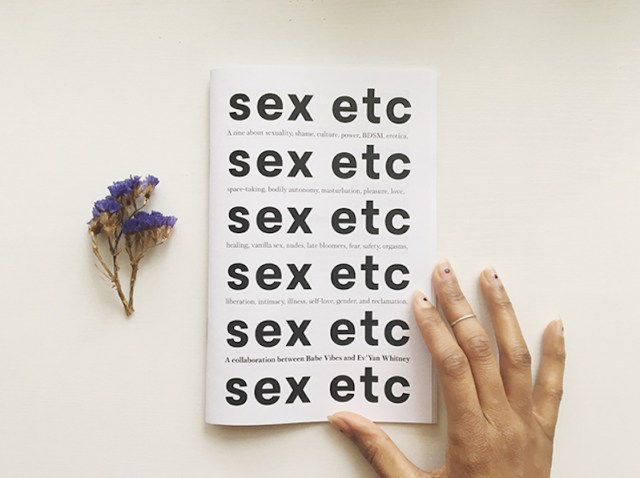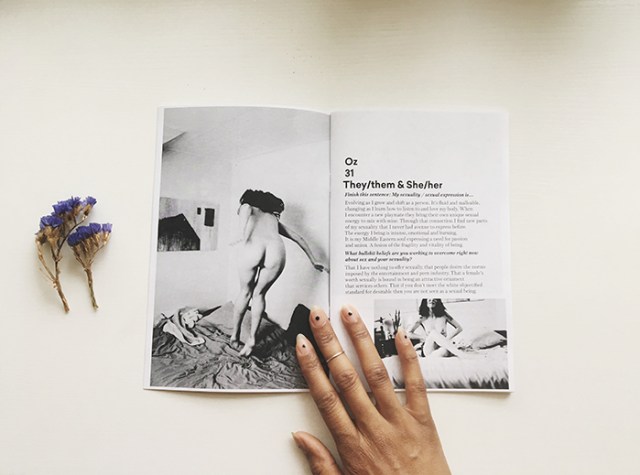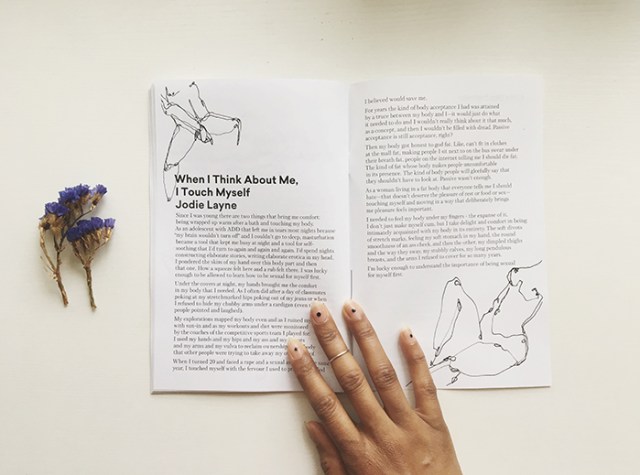“One way we can change the narratives around our sexuality and our erotic bodies is by taking up space as sexual beings and celebrating other women and femmes doing the same,” writes Ev’Yan Whitney in the introduction to Sex Etc, a new zine collaboration between her and Babe Vibes, run by Kara Haupt.
Sex Etc does just that, and explores the complexities and nuances of femme sexuality through interviews, photography, essays — by Ashley Reese, Chelsea G. Summers, Jodie Layne, and Whitney — and nude selfie photo collections as a way to shine a light on the often-hidden sexual self. (The print edition sold out almost immediately; the digital edition is available until April 20.) You can read an excerpt of the zine on A+.

photo by Ev’Yan Whitney
Below, Whitney talked to Autostraddle about how Sex Etc came to be, nude selfies, being where you are on your journey, and sexual revolution.
This interview has been edited and condensed.
Carolyn: In our emails, you mentioned that the catalyst for Sex Etc came from your explorations of sexy self-portraiture and personal sexual liberation in your essay, “How I Found Radical Self-Love By Posting Nude Selfies On The Internet.” Tell me more about that!
Ev’Yan: Around the time I was thinking about doing this project, I was thinking about the ways I could create a space for myself to explore taking up space in a sexual way that would keep me safe but would also not somehow keep me quiet. I started thinking about sexy self-portraiture — selfies — as a means of exploring that. I was doing it on Instagram, and when I posted these pictures with captions explaining the context […] the thing that I keep getting from women and femmes was, “I wish I were brave enough or in a position like you where I could post pictures like this and be able to share.”
I started thinking about the zine with the idea of what would it be like to give these types of women and people the ability to have — maybe for the first time — their selfies viewed in a context of sexual celebration and not through the gaze of a lover or man. So that was the frame of mind I was in when we started doing this collaboration, and then it just started to build from there.
“So often we see women’s sexuality through this lens of being performative and very male gaze-y, and I wanted viewers to look at these pictures and feel that we were owning our sexual narrative.”
Carolyn: What can you tell me about that collaboration?
Ev’Yan: The concept of doing something physically was really foreign to me but also seemed really sexy, the idea that I could make a zine and people could HOLD it. I approached Kara after she had just launched a zine about Beyoncé, which I thought was really interesting and looked really fun, with, “Hey, I have this idea and I would be really interested in potentially doing a zine with you about sexuality, written sexuality, and nudes.” I told her I was very interested in publishing nude selfies, especially. Soon after, we sat down and started constructing the outline of the zine, and that’s when I knew I wanted to have interviews and images of real women and femmes, in their bedrooms, where they were allowed to be as naked as they wanted to be and as they felt comfortable to be. That was always the vision, I just wanted it to feel very vulnerable, very raw and very real, because I think so often we see women’s sexuality through this lens of being performative and very male gaze-y, and I wanted viewers to look at these pictures and feel that we were owning our sexual narrative.

photo by Ev’Yan Whitney
Carolyn: With that goal, how did you approach the visuals?
Ev’Yan: I’ll start with the photoshoots. The most important thing for me and for Kara was having a diverse array of people in this zine. We wanted interviews and photos with people of various shapes, sizes, colors, ages, and gender identities. I was a little nervous about asking people to participate in this project because usually when you ask someone, “Hey, let’s do nude photography!” there’s a reason for it, like, a sexy photoshoot for your partner or maybe you work in an industry where that kind of thing is relevant, but I just wanted to take pictures of you looking like the sexual goddess you are for yourself. I was really really nervous people would be like, “I am not down with this, this feels really weird for me, I don’t like this idea of being exposed.” But, for the most part, I got a lot of folks that were really really interested […] Though, I saw some hesitancy from a lot of people… some of the first questions they would ask me were, “Well, how naked do I have to get?” and, “Does my body have to be perfect?” I remember one woman was like, “I’ve gained a lot of weight,” and I said, “I don’t care. This isn’t about you looking perfect, this is about you just standing in the truth of who you are as a sexual being, whatever that’s like for you.” And sometimes your sexual beingness at this point is really messy, or it’s unfolding, or you’re not sure what your sexual identity is, or where you are on the sexual spectrum, and that’s okay. I gave people permission to just come as they were.
“This isn’t about you looking perfect, this is about you just standing in the truth of who you are as a sexual being, whatever that’s like for you.”
We took these photos that were almost the opposite of “sexy boudoir” photos, which are very stylized and you’ve got the big hair and the eyelashes and the really uncomfortable lingerie, and I told the models to just be in a place of total comfort and ease with their bodies. If they wanted to wear sexy lingerie, that was their choice.
I didn’t get the chance to direct all of the shoots, but at one, it felt like we just sorta hung out! We went over to her place, we were talking for a little bit, and we were just shooting the shit in her bedroom on the floor, and all of a sudden it was just like, “Okay, let’s start!” And she took off her clothes and just laid on the bed and had a book next to her, and it just felt really comfortable. Which maybe had something to do with the fact that we knew each other before, but I wanted to capture the essence of that, to capture the essence of comfort and ease and the sense of confidence in where they were, which is why I wanted to photograph them in their bedrooms.
As for the nudes, both Kara and I put a call out, which was a really interesting thing because I’ve been on the other side of that with gross men asking for my nudes, and so I really really wanted to make sure in asking for these folks for their nudes that they knew we were only using them with explicit permission, and we told them, “You are more than welcome to share as much of yourself as you want.” We just really wanted people to have a choice of the narrative that they wanted to put into the zine. We didn’t want to dictate the way that people showed themselves, because that’s what the zine is all about: having folks show up as they are, wherever they are in their journey.

photo by Ev’Yan Whitney
Carolyn: Along with photos and essays, the zine includes interviews with women and genderqueer femmes answering questions that encapsulate their sexuality and sexual expression, investigate what bullshit beliefs about sex and sexuality they’re working to overcome, and examine their changing relationships with their sexual bodies and beings, among other things. In compiling those interviews, as well as in looking at your own experiences and journey, what common threads did you notice? What conclusions can you draw?
Ev’Yan: In the interviews, I wanted to again sort of suss out who they were as sexual beings in this really raw sort of way. One thing that surprised me a little was that so many of the people that were interviewed were so varied in where they were in their sexual journeys. We had one person who was like, “I don’t really know what’s going on with me sexually, I’m just here and I’m in this really weird place with my body right now and feeling some gender dysphoria,” and then we had a women who was going through cancer treatments and talked about how that was affecting her sexuality, and another woman who had kids and was in her 40s. To see it laid out in that way, everyone varied and vast in their stories, was just really beautiful. […] Everyone is so different and they deserve respect in their differences. They deserve to be seen and heard in their differences.
“My hope with the zine and in general is that we can take our sexual power back from systems of oppression that have historically tried and continue to try to take it away from us.”
Carolyn: The last words in the zine, in Jodie Layne’s essay “When I Think About Me, I Touch Myself,” read: “I am lucky enough to understand the importance of being sexual for myself first.” This line feels very summative for the project but also a little bit forward-pointing. What can being sexual for oneself first, taking up space, and celebrating other women and femmes doing the same lead to? What do you hope for the future of how women and femmes engage with themselves in that way?
Ev’yan: My hope with the zine and in general is that we can take our sexual power back from systems of oppression that have historically tried and continue to try to take it away from us. I hope that we can continue to write our own narrative around who we are as sexual beings, and that if I post a nude photo of myself it’s not seen as an invitation, but an expression of who I am as a sexual being, and the importance of being able to see that just because someone takes a sexy photo it’s not an invitation to comment on their sexual identity. I even don’t know that it’s possible, I don’t think we can ever get to a point where femme and women’s bodies are not sexualized in that way, but that’s a thing I’ve been thinking about a lot in my work: what would it look like if women and femmes stood in the truth of their sexual identities and it was so strong and so self-possessed that no one could touch us. My hope is that as we continue to do this work, we’re influencing others to take up space in this way, and saying a giant “fuck you” to all the people who are trying to impose these really rigid and ill-fitting narratives of who we are as sexual beings.

Eeee! Thank you so much for this feature and for taking the time to talk to me about this project of ours, Carolyn! :)
Thank YOU! ?✨
<3
Wow! This looks absolutely fantastic. So much of what is being said really resonates with me. :) Beautiful work
So like… I love this project and almost everything about it, but if i never see ‘femmes’ used as a shorthand for ‘women’ or ‘women and femmes’ presented as a coherent societal category again it will be too soon.
tbh i’d be way more willing to engage with the project if it wasn’t doing the “women and femmes” thing: i understand the intent of it, but the conflation of womanhood with femininity implied in “women and femmes” or using “femmes” to mean “women” is fucked up
I genuinely don’t understand this critique, because to me the use of both terms in that phrase does the exact opposite of conflating them. Like, if they were using “femmes” to mean “women” they wouldn’t need to say both?
Different commenter, but for me, the issue is that “women and femmes” seems to be used as a shorthand for “people who are targets of misogyny” or “women and people who aren’t women but are perceived as women” or “women and people with gender identities in the vicinity of womanhood”, it isn’t. There’s no consensus on the meaning of “femme” – is it identification with womanhood on at least a partial level? Identification with femininity? How is femininity itself being defined?
Taking “women and femmes” literally means that nonbinary people are only included if they identify as femme, including nonbinary people who are targets of transmisogyny specifically or misogyny in general. Also, femme cis men are included always (nothing against femme cis men, it just doesn’t seem to be the intent to include femme cis men in “women and femmes”.) In practice, “women and femmes” seems to mean “AFAB people”, and that’s the part where it’s a bit uncomfortable.
Hm. I had a completely different interpretation of the phrase (I took the “femme” part as an attempt to include anyone who identifies as a femme but not necessarily as a woman, which could also include AMAB people). I guess we’d have to know this specific author’s intent to be sure.
This is beautiful! Love.